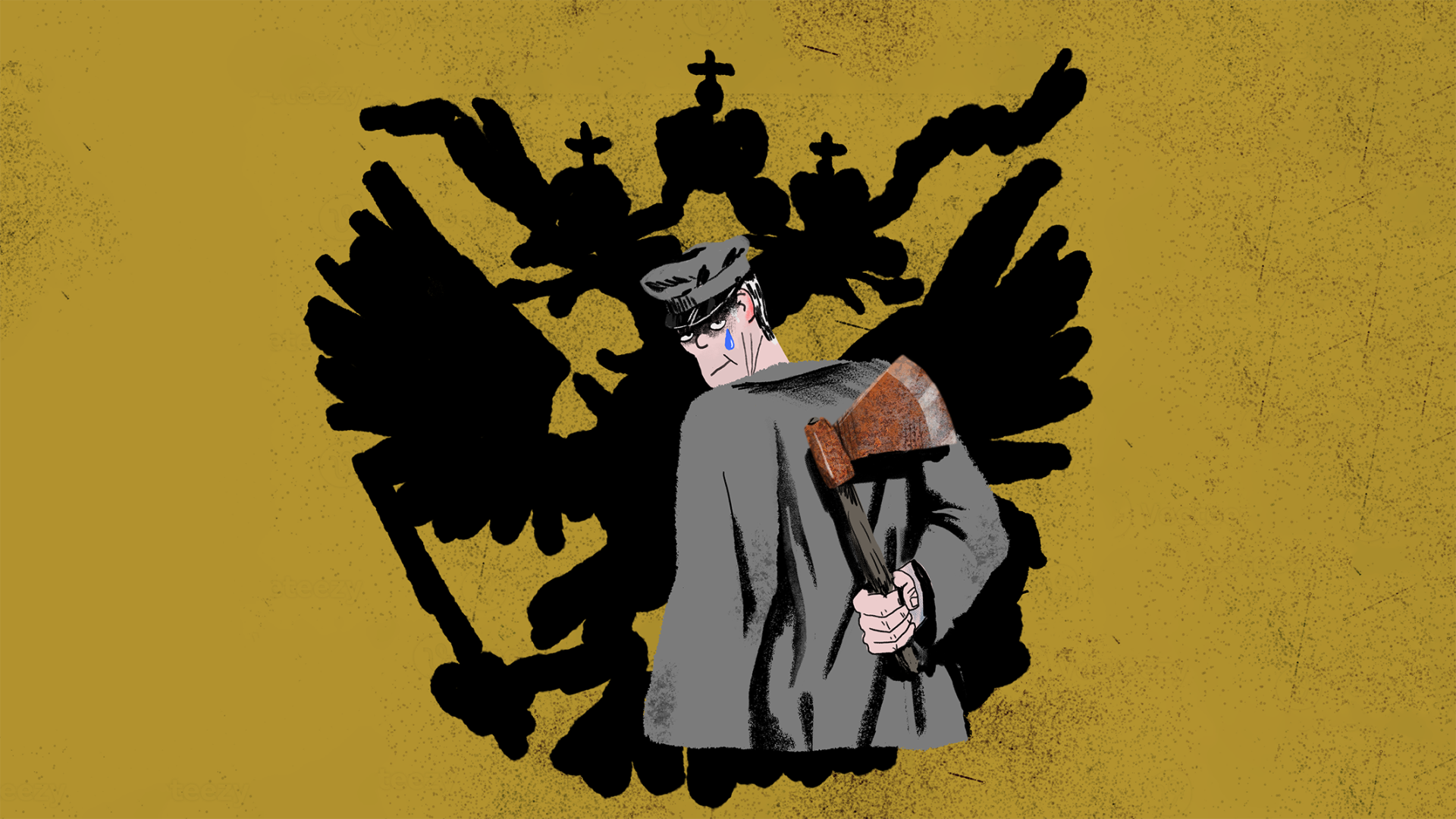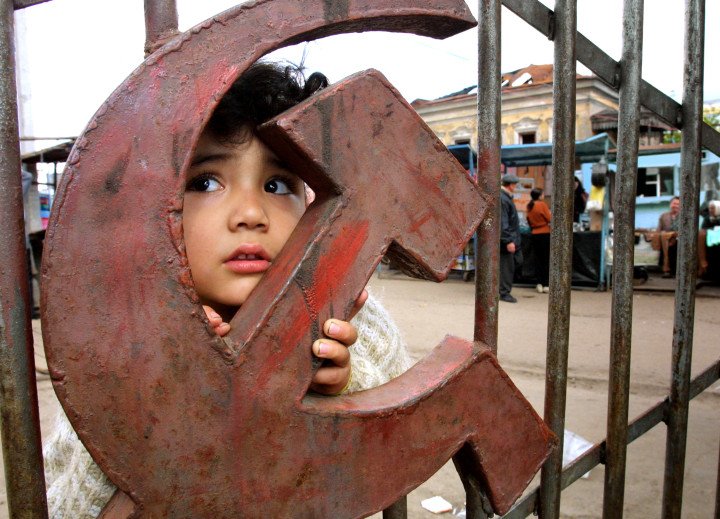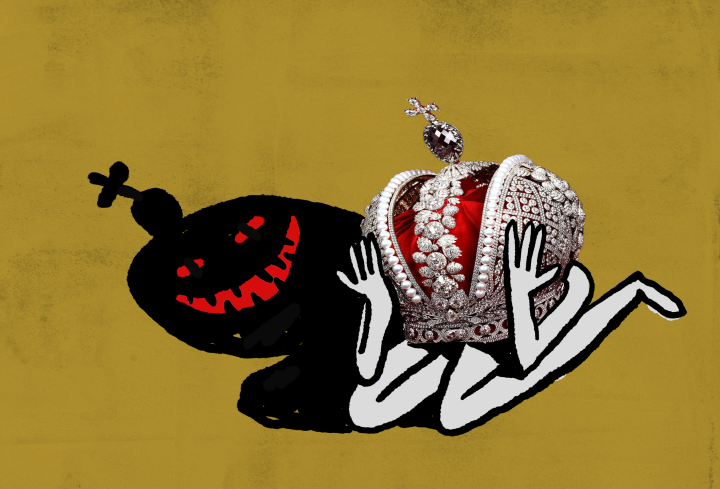- Category
- Perspectives
Why Do Russians See Themselves as Victims? Historian Dr. Botakoz Kassymbekova Explains “Imperial Innocence”

Many Russians, even among those who oppose Russia’s war against Ukraine, still hesitate to take responsibility, blaming the invasion on NATO provocation or conspiracy theories about US meddling and a coup. Experts say that this is because the “victim” mentality persists in Russian society today. But why is that? Our reporter Yev Kopiika interviews Dr. Botakoz Kassymbekova, an Assistant Professor in Modern History at the University of Basel.
Some point to the historical brutality of Russian regimes or even the difficult situation in the 1990s. But some oppose this notion, reasonably pointing out that not only Russia but Ukraine, Kazakhstan, and other countries in Central and Eastern Europe and Central Asia experienced a brutal Soviet regime and even more difficult 1990s. While Russia was aided by the West to recover from collapse, these countries were not or much less so. Yet, neither Ukraine nor Kazakhstan initiated brutal wars while portraying themselves as victims.
So, for some experts, the difference between Ukraine and Kazakhstan, as opposed to Russia, is clear: Ukraine and Kazakhstan were colonies of an empire, while Russia was the empire. But what about today? Is Russia still an empire?
That was the first question that I asked Dr. Botakoz Kassymbekova, an Assistant Professor in Modern History at the University of Basel, specializing in Soviet and Russian imperial history.
“There is a consensus that the Russian Empire before 1917 was a colonial empire. Simply because there were concepts like ‘others’ and ‘legal others,’ which means that those who were considered as ‘aliens’ (inorodtsy) were subject to a different legal regulation. However, during the Soviet period, nominally, there was one constitution for everyone. This led many to conclude that the Soviet empire was not colonial,” she says.
That’s what Dr. Kassymbekova’s work is about: explaining why this is not true and why we cannot apply Western concepts to understand the Soviet Union.
“We know that in January 1991, when Lithuania was the first republic to actually proclaim its independence, it did so based on the Soviet Constitution, which granted all republics the right to leave the Union. Yet, when Lithuania declared independence, the military violently suppressed this decision. So, what was written in the Constitution had little to do with reality. Therefore, we need a different analysis and explanation for the coupling of a dictatorship, totalitarian regime, and colonialism.”
We cannot simply apply Western concepts to Russian imperialism.
Dr. Botakoz Kassymbekova
Assistant Professor in Modern History at the University of Basel
What about Russia nowadays?
“We have a very similar situation with 21 republics. They should be able to exercise their sovereignty, but we remember the history with Chechnya and Tatarstan, where attempts at independence were suppressed by violence or, as in the case of Tatarstan, threats of force. The rule there is based on violence, not on the decisions of citizens or the law. So, of course, the political suppression of these republics constitutes a form of colonial rule, allowing the theft of natural resources and the use of these territories and its people for other imperial conquests.”

“Some regions are not interesting for natural resources but are valuable as gateways for territorial expansion. It is not true that abundant natural resources are the only reason for colonization or that only less industrial regions are colonized by an industrial one. For instance, during the Soviet period, the Baltic countries were colonized and occupied due to their geopolitical position, developed infrastructure and industrialization. Uzbekistan and Tajikistan were an important source of cotton, Ukraine offered both agriculture and industries. Crimea was important for military reasons. While all formerly colonized territories were different, all of them were crucial for the Russian core to maintain superpower status. The idea of controlling world politics, bullying other countries, and influencing global affairs is tied to possessing these territories. Another aspect of Russian colonialism lies with the understanding that the ability to bully western Europe allows global dominance. Hence, the expansion westward was seen as key for the global influence. This historical vision does not allow Russia to understand itself as part of Europe as it needs to dominate and therefore rival with Europe. Colonized territories allow that. Without them, the Russian metropole feels incomplete, weak, and unable to dominate the world stage. This notion of being ‘down’ without controlling these territories is a persistent theme from the 19th century to the present.”
Considering Soviet and Russian imperial history, and the present day, why do you think the West is reluctant to acknowledge Russian imperialism?
“While some in the West understand Russia as an empire, many others prioritize their own interests. Many bought the idea that Russia guarantees peace in the region, an imperial idea Moscow created to claim dominance. German historian Gerd Koenen explained in his book ‘The Russia complex’ that Germans co-created this story because historically Germans projected their imperial fantasies onto Russia. If Russia isn’t perceived as a threat, it’s often viewed simply as a superpower. However, the perspective is shifting, especially in Europe, as the implications of Russia’s imperial ambitions become clearer.”
Historically, the Russian empire has been adept at rebranding its territories. For example, during the Soviet era, calling the USSR simply ‘Russia’ was a strategic move.
Dr. Botakoz Kassymbekova
Assistant Professor in Modern History at the University of Basel
“The Russian Federation is not the same as Russia. No, there is no such thing as Russia in and of itself; there is a Russian Federation, which is essentially a euphemism for the Russian Empire. Many people still refer to it as Russia. A lot of work needs to be done to explain that we cannot simply use this shortcut, as it disregards the 21 republics within the federation, each with its own constitution and parliament. For example, Chechnya, Tatarstan, Dagestan, Kalmykia, and the Altai Republic are not just ‘Russia.’ Calling the entire federation ‘Russia’ has been a very successful communication strategy, but it oversimplifies and erases these diverse nations. The same the Russian empire is trying to do in Ukraine.
Another effective Russian propaganda strategy is to portray the country as an indispensable global player. It instills fear, suggesting that the Russian Federation’s disintegration would lead to widespread chaos or lead to global chaos. This narrative echoes past threats from the late 1980s of civil war if republics sought independence. However, the collapse of the Soviet empire was largely peaceful. Moreover, most neighbors of the current Russian Federation score much higher in democracy indices than the Russian Federation and some, like Estonia, are one of the most robust democracies in the world. Moscow tried to convince everyone in late 1980s that these republics’ independence is dangerous, but history showed that actually the Russian Federation developed into the least democratic and the most violent of all constituencies of the former Soviet empire.
The challenge lies in the lack of a robust anti-colonial intellectual movement within the Russian metropole. Many Russian intellectuals, even liberals, harbor imperial sentiments. This complicates the issue as they often perpetuate the myth of a “united Russia” rather than acknowledging the colonial nature of the state.”
“Mikhail Khodorkovsky’s statement that those seeking independence 'will have to die' exemplifies this colonial mindset. It’s a declaration of war against any attempt at self-determination. This narrative of inevitable civil war is a carefully crafted imperial lie.
Many Russian intellectuals aspire to Western values and lifestyles but simultaneously endorse imperial sentiments. This internal contradiction hinders the development of an anti-colonial intellectual movement. Without a strong intellectual foundation challenging imperialism, the perception of a monolithic Russia persists, obscuring the reality of a violent colonial regime.”
In the early months of the full-scale invasion of Ukraine, Dr. Botakoz Kassymbekova and Dr. Erica Marat coined the term “Imperial Innocence” in an article titled “Time to Question Russia’s Imperial Innocence.” I asked Dr. Kassymbekova to explain to our readers what “Imperial Innocence” means.
“Yes, 'Imperial Innocence' is a term that came to me several years ago, perhaps a couple of years before the full-scale invasion. I was sharing my ideas with Dr. Erica Marat, a long-time colleague and intellectual partner. She is a political scientist, while I approach our region from a historical perspective.
We both observed a common thread among Russian intellectuals, society, and the regime: the idea of Russian imperial goodness. This is the belief that Russia brings benevolence and doesn’t understand why others are not grateful.
Dr. Botakoz Kassymbekova
Assistant Professor in Modern History at the University of Basel
As you know, Catherine the Great justified the colonization of the Caucasus as a Christian mission of kindness. Such liberal Russian historians, ardent critics of Vladimir Putin, as Yuri Pivovarov claim that Russian colonialism was beneficial or even crucial for the survival of the colonized. He recently suggested that non-Russian benefited from the Russian empire because its authors were translated into Russian language and became known to more people, suggesting that otherwise the “savages” were not even known to the world.
Of course he thinks that the disintegration of the Russian Federation will not be beneficial for the non-Russian republics. The idea that Russia civilizes and enables was prevalent even in my childhood, with Russian teachers claiming that we should be grateful that we avoided the fate of India under the British colonial rule. This self-image of a benevolent, sacrificing power is deeply rooted in Russian discourse.
When I see with which inhumane violence Russian soldiers colonize Ukraine, I draw parallels between this discourse of benevolence and innocence and the extreme violence, both are interconnected. I argue that this violence stems from a desire to punish. Hence, the Russian army does not simply occupy, it wants to punish Ukrainians for not feeling gratitude for Russian greatness, for disloyalty. Ukrainians for them are traitors, who did not appreciate Russian sacrifice. The message is clear: 'We brought you goodness, we suffered, and you should be grateful. If not, you will be punished.' This paternalistic thinking ultimately translates into inhumanity. The extreme cruelty we witness in Ukraine is rooted in this larger imperial narrative nurtured by the Russian regime, society, and intellectuals.”
Do you think that the current narrative of Russians feeling weak is useful for them right now?
“I think it’s a very strong belief, not just a strategy. It’s rooted in the Russian imperial and national ideas, which are essentially the same. The challenge for the new generation of Russian and non-Russian intellectuals is to separate these ideas, as Russia’s expansion and identity were built on imperialism. This idea includes a sense of victimhood and sacrifice for the state, where being poor or suffering is acceptable as long as Russia is big, feared, and ‘taken seriously.’ Here, respect is equated to fear, rather than based on the concept of equality and cooperation.
Russian colonial expansion often involved sending prisoners or outcasts, who might otherwise be imprisoned, to distant territories like Siberia, the Caucasus, and Central Asia. This was also seen in the foundation of the Gulag system, which was intended for colonizing remote areas. This concept, known as penal colonization, was also practiced to colonize Australia.
There’s a strong narrative that combines victimhood and imperial expansion. Even as prisoners, Russians were colonizers in these distant places, which strengthened the cultural identity of suffering and sacrifice. This experience has produced a cultural figure of the colonizer who was also a captive, most strongly expressed in the figure of the Caucasian Captive, first created by Pushkin and then retold by Tolstoy, Lermontov, Soviet and then post-Soviet Russian authors. The basic idea is that Russia sacrificed its best sons to save (read colonize) non-Russians. This narrative is also linked to the idea of Russia as the “Third Rome,” responsible for protecting Christian values and embodying a moral duty to suffer.
These factors contribute to a national identity centered on being a victim. However, this victimhood can quickly turn into aggression.
Dr. Botakoz Kassymbekova
Assistant Professor in Modern History at the University of Basel
The current regime portrays itself as a victim of the West and uses this as justification for aggression, suggesting that the way to stop being a victim is to become an aggressor. This victim-aggressor dynamic is ingrained in the political identity. The task for the future is to liberate from this victimhood and recognize that it served as a guise for aggression. Figures like Pushkin himself, seen as victims, were also colonizers, and it’s crucial to acknowledge both aspects to develop a new political identity that moves beyond this binary.”
I’ve noticed that Russians often claim victimhood when discussing history and politics, such as the Holodomor or the “Executed Renaissance” in Ukraine. Whenever I brought up these events with Russians, they would quickly point out that they were also victims, as if it was a useful defense.
“Yes, it’s understandable because many Russians did indeed suffer. However, the concept of victimhood varies depending on the context. The Ukrainian nation, for example, faced attempts to erase its literature, thought, and independence. While many Russians, including critics of the regime, were imprisoned and suffered under Soviet rule, the experiences differ significantly. Russian culture, language, and literature were celebrated and preserved, even during the Soviet era. In thirteen out of fifteen Soviet republican hymns, non-Russians had to thank Russians for their happiness. In contrast, Ukrainian, Kazakh, Chechen, and other cultures were suppressed, and their languages struggled to survive.
The difference in victimhood lies not only in the numbers—such as the catastrophic death of 40% of Kazakhstan’s population—but also in the broader cultural impact. While Russian intellectuals and classics thrived, also because resources were concentrated in the metropoles, many other cultures couldn’t develop similarly or were extinguished. This disparity can be hard to acknowledge, especially when one considers one’s culture as special and beneficial for others. In the early 1990s, some Russian intellectuals recognized and spoke about this issue, but such voices have become rarer since the 2000s. The desire for national greatness often overshadows the ability to recognize others as equal and worthy of acknowledgement. Whether this will change remains uncertain.”
Anything you want to add as a conclusion?
“One thing often overlooked, especially in Western countries, is that the collapse of the Russian Empire in 1991 brought many opportunities for millions of people. The nations that gained independence had the chance to pursue a life of dignity, democracy, and freedom—something impossible under Russian occupation.
Even in places like Kazakhstan, which isn’t a democracy, the end of occupation offered a chance for a dignified life and the opportunity to build something new, even if the journey is fraught with challenges. The potential for freedom, the ability to walk, speak, dream, and live differently, is incredibly promising. This extends to the rights of women, children, minorities, and disabled people, who now have a chance to fight for justice.
This movement for sovereignty and equality should be viewed as a human rights movement. It’s about the freedom to make choices, something the Russian Empire has historically suppressed. Liberation from Russian colonialism is fundamentally about advancing human rights, diversity and democracy.
While there have been moments of liberalism in Russian history, they were suppressed. The current Ukrainian resistance symbolizes a new hope, albeit at a tremendous cost. It’s a tragic situation that this hope has come with such a high price.”
I think Russian propaganda made a huge miscalculation by portraying Ukrainians as narrow-minded nationalists fighting only for Ukrainian folk songs, and language. In reality, many Ukrainians on the front lines are Russian speakers or of Russian ethnic background. They’re not necessarily fighting for the Ukrainian language or culture, but for the right to choose—to speak Ukrainian, Russian, or any other minority language.
“They know that if they were under Russian control, there would be no choice. Everyone would have to identify as Russian, suppress their own stories and identities, and participate in state-imposed conformity. This enforced suppression is the essence of Russian imperialism.

This historical shift is revolutionary, not just in Ukraine but also in Kazakhstan and other nations. In Kazakhstan, many — if not most — former settlers, whether ethnically Russian, Ukrainian, or Germans who were sent there against their will, have actively participated in overcoming colonialism by becoming part of the Kazakh society. More and more ethnic Russians no longer identify as Russians; instead, they consider themselves Kazakhs with Russian cultural backgrounds. This transformation is marked by a humanist, universal, and anti-colonial discourse emphasizing choice. In Kazakhstan, this shift has led to a democratic and hopeful consolidation. Former settlers, now critical of colonialism, are celebrated by Kazakhs for their stance. They reject the narrative of victimhood and embrace agency, asserting their commitment to an independent Kazakhstan as their homeland. This is very special. Overcoming colonialism is not easy, but it is possible through a common political stance. And I think, in general, for all of humanity, for the history of colonialism, for me as a historian, I think it is a tremendous, tremendous change. And I think it is a very interesting political development.”



-588ae190d45987800620301cc34e2cf8.png)

-886b3bf9b784dd9e80ce2881d3289ad8.png)

-c42261175cd1ec4a358bec039722d44f.jpg)
-46f6afa2f66d31ff3df8ea1a8f5524ec.jpg)